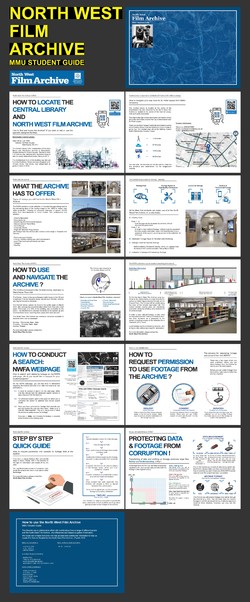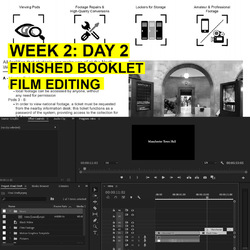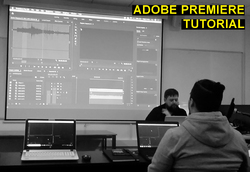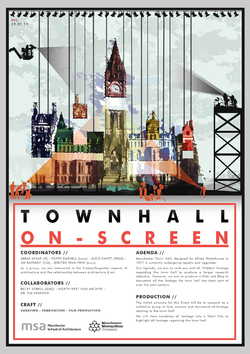Group D TOWN HALL ON SCREEN
‘On Screen’ is a collaborative project that will bring together students from the Manchester School of Architecture with our collaborators the NWFA. (North West Film Archive). Using our creative skills, we plan to promote and raise awareness of the archive and its available resources to us as students. We aim to engage future and existing students by developing an instructional guide representing how to use the archive.
Manchester town hall is an iconic landmark of the city. The town hall has been a stage for many events throughout history, ranging from film sets to political rallies. We wish to shed light on the significance of the town hall and demonstrate how it is a fundamental piece of the city’s history. By collating clips of NWFA footage, we hope to convey the story of the town hall. // Download Poster
Jim R // Abbas A // Alice D
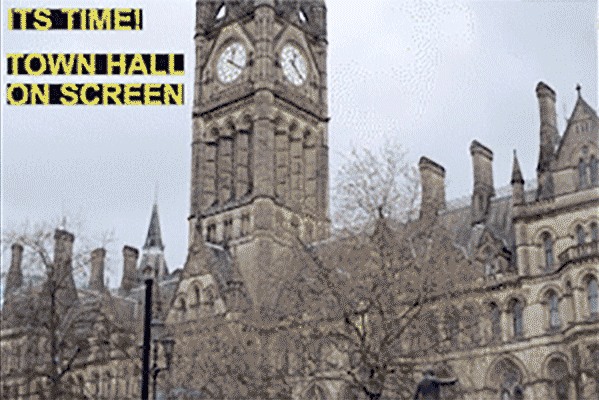
Week 2 – concluded
Week 2 has come to an end and so has events. This week was a very intense and productive week with a lot of blood, sweat and tears mainly due to Jim's laptop dying, however, progress was made, and the film was completed. Both teams came together to work on the Film to make sure that 100% of the possible work effort could be directed towards the final outcome. The 1st and 2nd years gave their all to make sure that the tasks they had been working on were completed before Thursday's test screening at the Cornerhouse theatre.
The MMU Student booklet on how to use the North West Film Archive was near completion and had been sent to our collaborator Geoff Senior for final comments. The comments and feedback received were beneficial in providing more in-depth input into the guide before being finalised.
With everything completed, it was finally time for the debut of Manchester Town Hall: On Screen. This couldn’t have happened without everyone’s help and valuable effort over the past two weeks. The premiere was a massive success with both the public and our collaborator enjoying the final outcome. In the end, the premiere concluded without a single problem, and we even got to enjoy the film with popcorn.
Posted 7 Apr 2019 22:25
Week 2 - Day 05
Here is a poster showing each page within the completed booklet on 'How to use the North West Film Archive' which will be used to highlight the facilities and steps required for students to request footage from the Archive.
Posted 6 Apr 2019 22:52
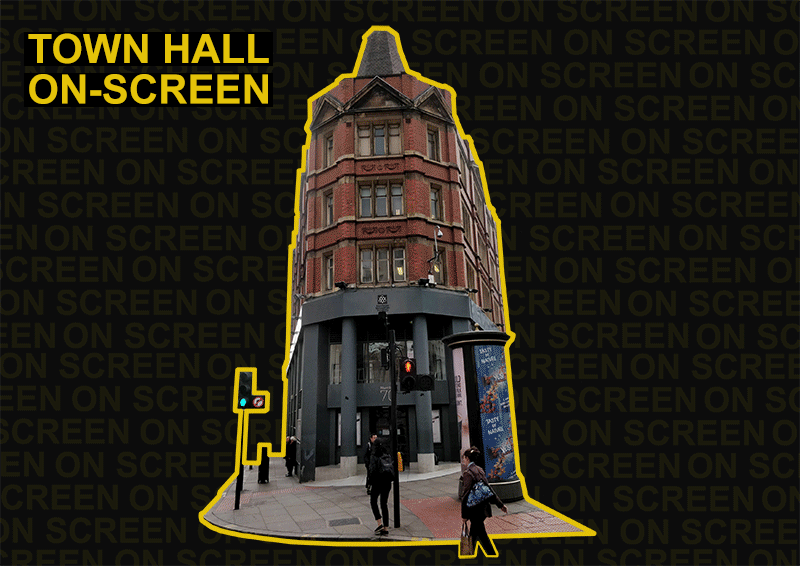
Week 2 – Day 05
Town Hall On-Screen Premiere
Friday marked the last day of Events. It was also the make or break day in regards to the Film premiere. However, thanks to everyone’s valuable effort, careful planning and thorough checks throughout the two weeks of the events. We were very optimistic that everything was going to work out, which it did.
We started the morning by meeting at the Cornerhouse theatre at no. 70 Oxford Road. We had a look at the venue space to make sure that everything was ready. All equipment was set up to allow for everything to transition smoothly with this done we carried out a test premiere before members of the public arrived. We already knew that the film was already going to be formatted correctly with both sounds and visuals being at the optimum levels, but it’s always good to double check.
At 1 pm, it was time to premiere the Film. Everything went exactly as planned with the master students providing a brief introduction to the Event and the archive guide booklet. Finally, the Film was shown to the public and our collaborator Geoff Senior. The overall reception was great, and our collaborator was also pleased with the outcome and mentioned that both the film and guide booklet would be great additions to the archive to further advocate the uses of the archive to Higher Education Students.
We want to thank everyone who attended the premier to view Manchester Town Hall: On-Screen. We would like to especially thank the 1st and 2nd years for the valuable contributions and engagement over the past two weeks, without you it would not have been possible and to such a high standard, thank you. We want to thank, Geoff Senior and all the members at the North West Film Archive and Sam Heitzman from the Digital Media+ team for providing the information and skills necessary to make the film and booklet and we hope you enjoy the final outcomes as much as we did making them.
Thank you,
Group D
Posted 6 Apr 2019 22:45
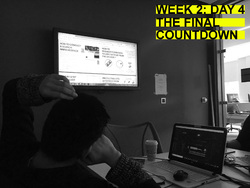
As Events is coming to an end, our group worked towards finalising the film. Brushing up on minor errors to ensure it is of high quality. We started off the day by reviewing the final film and making notes of a few improvements we could make to the texts, sound effects, video transitions & etc. Together we worked hard as a team to make these minor changes as time was running low. Sound in particular was adjusted as there were moments were the volume of the footage would appear to get dramatically louder. This was a simple fix and adjusting the sound bar allowed us to fix this issue.
The leaflet team were working on the final output by putting sheets together and adding final touches to the booklet. The booklet had been sent to Geoff Senior for comments and these had to be incorporated in the final booklet, before review tomorrow. It was at this point where we ensured the booklet was referenced properly where appropriate and added the acknowledgements.
The final touches were completed and we’re ready for the premiere of Town Hall: On Screen and the release of the instructional guide tomorrow!
Posted 6 Apr 2019 22:02

Week 2 - Day 03
This morning, we continued to finalise the edits required for the transition between existing and new footage for the film. Some members of the team returned to the town hall to record additional footage which was required for the film, to compliment the footage from the Archive.
The 1st and 2nd years began searching for sounds which could be overlaid and embedded within the footage, to provide alternative emotional responses. Adding sounds to the footage was the final stage of the editing process and for the overall film production.
Throughout the production and editing of the film, we have come across some issues regarding the transferring of footage, data and processing power required to edit footage.
• During the event, not everyone had access to high-powered laptops, which hindered our decision on which tasks should be given to the first and second years.
• The low processing power of laptops affected even the high-powered laptops owned by master’s students. They started to become less responsive and began to crash due to file sizes becoming too large.
• Backward compatibility was also an issue, this was because some students had access to Adobe Premiere Pro CC 2019 and other used Adobe Premiere Pro CC 2018. This created problems when we began to transfer files of the edited footage to the person-in-charge of the Master file.
The ‘How to use the North West Film Archive’ booklet has been completed and we will be sending it tomorrow morning to Geoff Senior at the North West Film Archive for final amendments and to be signed off. Over the past 2 weeks of the events, we have also been able to create 3 videos alongside the booklet which have been implemented into the booklet using QR codes. These can be viewed by students if they require further assistance on how to use the Archive.
Students have also printed out posters, which have been placed around the Manchester School of Arts building to advertise the Film Premiere at the Cornerhouse Theatre on Oxford Road – 05/04/2019.
Tomorrow, we will be sending the Final booklet to Geoff Senior and we will be testing the Film at the Cornerhouse Theatre before it is shown on Friday. This will allow us to make any final sound or footage resolution adjustment before the Premiere on Friday.
Posted 3 Apr 2019 19:01
Tuesday - 2nd April
Today both teams met in Stopford building in the morning to finish the last parts of the film editing and how the information about the event will be spread to other people around Manchester.
The film editing team is about to complete their work, after retro transition video was made and all footage and images were assembled into a short movie. New impressive sound effects were added, as well.
The booklet team was working on some final details on how to use the North West Film Archive (NWFA) website.
The next step was printing out draft copies for which the format, resolution and scale of the text and the images were carefully taken into consideration. Therefore, the team could get a sense if there was any difference between the way copies and onscreen information looked.
Copies of the latest poster for the Film screening on Friday were printed out and discussed where to be pinned up.
Posted 3 Apr 2019 12:59

It’s the beginning of Week 2! In the morning, we had a quick progress meeting where it was established that teams needed to be mixed around in order for the film to be completed by our deadline. We collectively agreed that the instructional leaflet was progressing well ahead of schedule so members were able to move across to the film team.
The guide team’s activities included finalizing the pages about the NWFA Consent & how to find the location of both Central Library and North West Film Archive (NWFA) as well as collating all pages into the final booklet. The film team were working towards finalizing the intro and outro, whilst experimenting with transitions/ filters. During this time members of the team were also on the search for sound effects that could be added to the film in the final stages. The credits of the film were finalized alongside the blooper real. Content for the film was also being collated in the form of analysis, with maps depicting how the town hall and the surrounding area has evolved over the years. The overall timeline for the film was also finalized, organizing the films and events chronologically. The aim of the following day is to finalize the instructional guide, to be sent to Geoff Senior for comments. The aim for the film team is to import every piece of footage and images minus transitions.
Posted 2 Apr 2019 12:56
After speaking to our collaborator Geoff Senior from the NWFA, our film screening is now being advertised on their website. Please click on the link below.
https://www.nwfa.mmu.ac.uk/public_screenings.html
Furthermore,
the screening is also being promoted by word of mouth by all members of Events Group D. Moreover, posters that we’re made are also being placed around the actual archive and all over arts school to get a large audience.
To ensure that all people are going to fit, we are asking people to confirm if they are going to come. If needs be, there will be two screenings to accommodate the number of people who wishes to view the film.
Posted 1 Apr 2019 17:12
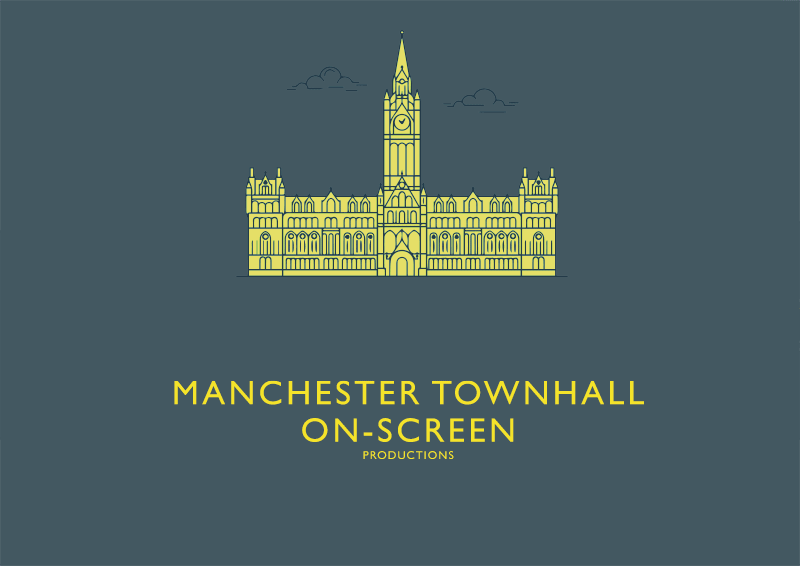
Week 1 - Concluded
Week 1 has come to an end. This week has been quite a productive and informative week from the start, with presentations to meeting collaborators and visiting the North West Film Archive. Both teams have come together to collectively work on both outcomes to achieve the best results, with surprising talent being shown from both the 1st and 2nd years.
The Film team have been progressing through the storyboard they created throughout the week, with steps being undertaken to tackle each scene. Footage housed at the Archive is currently being edited frame by frame before being incorporated into the 3-minute film.
The Leaflet and Promotion team have come together to work on producing an in-depth guide on using the Archive and how to best promote and communicate the benefits of the North West Film Archive to students, by showcasing the accessibility, facilities, and means to request footage from the Archive.
Week 2 - will commence with both teams moving closer towards each of the outcomes for the Films Premiere at the Cornerhouse Theatre, Oxford Street on April 5th.
Posted 31 Mar 2019 00:45
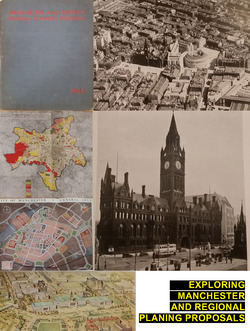
As mentioned in the previous blogs, the town hall was under threat of being demolished and replaced. To get a clearer picture, two undergraduates went to the central library accompanied by one master student. The students reviewed the book ‘Manchester and District Regional Planning and Proposals (1945) which contained local maps, and visualisations of how the town hall may have looked like if the plan was carried out. The book included transport maps routes for highways and trains.
Furthermore, it included breakdown of building types, future proposals for existing buildings. Flicking through the book, this gave us a knowledge and a clearer idea of how the streets, squares and building infrastructure would’ve worked as part of the city fabric. Therefore, in our film, recreating this feeling would be easier.
After reviewing existing films, some video clips did not come out as we wanted. Some we’re skewed or unlevel therefore an hour of the morning was spent recreating these shots. Meanwhile, the team who did not film in the morning, intensive research was done for the different events throughout the years in Manchester. Different news article we’re reviewed to see how the event influenced the population of the city.
Some of the illustrations done online we’re hand drawn by some of the undergraduates to ensure all the recreated events matches in drawing style.The preferred adobe premiere template styles we're also applied to our existing footage for the first time.
Posted 29 Mar 2019 15:31

To start off the day of film editing using Premiere, the storyboard was worked up. From intro, going through the timeline of how the Town Hall represented Manchester’s character. However, as we found out from Geoff Senior, this was not always the case.
In 1945, Manchester’s town hall was under threat to be demolished according to Manchester’s city plan. It was proposed to be replaced by an art deco town hall. However, it was not a popular opinion amongst the residents of Manchester. 15 years later, it was again proposed to be demolished to make way for a monorail. The council considered plans for a £21m, 16-mile monorail. This monorail would have been placed underneath the Town Hall. However, due to economic decline in the 1970’s this was never carried out.
The threat of the character disappearing by the demolition of the hall was then decided to a driving theme to our film narrative. The film takes you to an alternative reality of how Albert Square and the Town Hall may have looked like if it was demolished.
“Throughout the years, Manchester’s town hall held the character of the city. Offering an urban realm for public services ranging from parades to festivals. However, this was not always the case. Its had its fair share of battles”
Furthermore, the group also explored different film templates of how we may represent the timeline (see picture post). This was decided as a group and once settled, different scenes were allocated to each member.
• One member was in charge of the first 10 seconds introducing the town hall in all its glory.
• Two team members used their hand drawing skills to show visualisations of how Manchester may have looked like.
• End credits (20 seconds)
• Literature content writer
Overall, the exercise revealed what kind of shots are missing. Furthermore, the completed shots showed us that we are one missing key aspect, sound. This will be addressed in the next couple of day.
Posted 29 Mar 2019 12:31

Today, we began to break down each of the tasks required to make the booklet on how to use the North West Film Archive. The key points of focus had been highlighted in a previous blog post which provided us with a break down of the relevant information required for the guide.
Each key focus point was given to a 1st and 2nd year student. With this they can now move forward to produce 2 pages for the booklet explaining these Key points, as follows;
- Pages 1 & 2: Location of the Archive, how to arrive and transport links for access (QR Video)
- Pages 3 & 4: Internal plan of the Central Library highlighting the Archive and the other available facilities in the library
- Pages 5 & 6: The facilities which are available at the Archive.
- Pages 7 & 8: How to use the Website and how to use the Archive viewing pods (QR videos) and how to request the footage and seek approval
- Pages 9 & 10: A step by step timeline of the whole procedure and the format which the file will arrive and the different safety methods to work with for safe data handling, since this is for students.
After the tasks had been given out, we then proceeded with a tutorial on how to use Photoshop, Illustrator, and Indesign to prepare the 1st and 2nd year students, so that they could design the pages for the guide.
Posted 28 Mar 2019 23:30

This morning we were lucky enough to have Sam Heitzman from the Digital Media Hub give a tutorial to all on adobe premiere pro. Before events began the master’s students decided to
use this video editing program to create our film due to the program being available on both mac and PC. This decision was also made because the majority of architecture students are familiar with a variety of adobe suite programs and the layout and functions tends not to differ much between programs, making learning easier.
Sam Heitzman began the presentation by running us through what video actually is and the different types of computer storage devices, including external drives and USB sticks. Sam pointed out the importance of USB as simply a device to transfer information from PC to PC but never a device to work from. This was important our collaborative working but also a helpful tip for all students and how they should handle all their files.
After running through the previous information Sam opened up adobe premiere pro on the presentation screen and ran us through the basic functions of the program and its interface. These basics included how to import and export film footage. The export information was particularly crucial to us as a group as we will be working on different sections of the film on individual laptops and then collating footage into one final film. Therefore, it is important everyone’s export setting match. Sam advised us to use the H.264 setting for export as it creates a high quality video that is good for both online and screen viewing. What’s more it is important to check both the export video and export audio boxes are checked when exporting to avoid creating a silent film.
Sam also helped us identify the difference in formats between the archive footage and the camera and iphone footage we have shot. All archive footage is 1080p as well as our camera footage however while most iphone footage is h.264 with 30 frames per second. This is important as it means when we import footage into premiere pro they will differ in image size and frames per second. Although this is an issue we learnt how this can be rectified. We learnt that by playing with scale we can either reduce the size of the 1080p image to match the iphone footage or vice versa. Sam recommended that we shrink the 1080p footage down to avoid pixelating the iphone footage when scaled up.
This was an extremely informative session that enabled us to gain some of the basic skills required to create our final events film. Sam in particular was extremely knowledgeable and a great teacher. This session also helped raise student’s awareness of the digital media bar as a great resource to students. The digital media bar is located on the first floor of the Chatham Building and open Monday to Friday for students use. More information is available in the link.
http://www.artdes.mmu.ac.uk/resources/digitalmediabar/
Overall the film editing skills they learnt will not only be useful for the final events film but for the second year student’s submission of their humanities film at the end of April. We look forward to finalising our story board tomorrow and testing out the new skills we learnt today!
Posted 27 Mar 2019 13:08
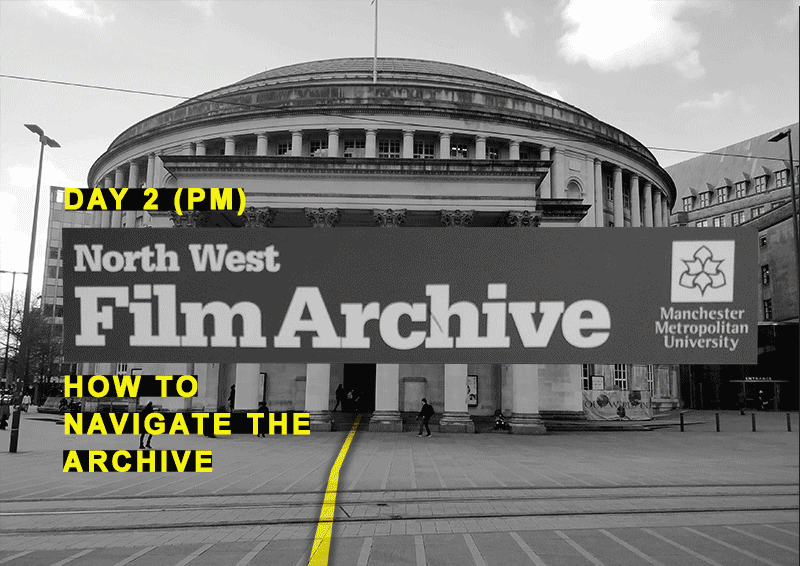
The Second Day was marked with a visit to the North West Film Archive to allow the 1st and 2nd years with first-hand experience using the archive. We began by taking a tour around the NWFA viewing pods and towards the viewing rooms, which was followed by a tour across the other facilities housed at the Central Library.
During the morning presentation by Master students, Geoff referred to a film at the archive called ‘A City Speaks’ which is regarding the redevelopment of Manchester in the post-war era. This was a great opportunity to test students to see if they remembered how to use the archive from the morning presentation.
Even though this was a task given to the 1st and 2nd year students to better understand the archive and how we could transfer this knowledge into the leaflet. We ended up learning about a lot of new information which previously was unknown regarding the archive.
- The viewing pods are split in local footage viewing pods which contain footage which is local. These can be viewed without any prior permission, these are pods 1 & 2 (each pod has a large number printed on the side)
- Viewing pods 3–8 provide national footage however to access these pods, you must go over to the information desk and request a ticket. Each ticket allows a maximum of 2.5 hours of viewing time and each ticket is inputted into the system similar to a password to gain access to the collection.
- If you are struggling to find footage from the words you are searching, you could try to add an ‘s’ to the end of the word to prompt the search engine to find more films. This is due to the system index having multiple keywords which are cross-referenced and if you continue to struggle it’s always a good idea to approach the help desk.
Another task which we undertook while touring the Archive was to document a storyboard which we could use to create how to navigate the archive video for the QR codes inside the leaflet. We collectively thought about a progressive route to highlight each of the relevant steps required to find, locate and request footage at the North West Film Archive. We hope to use the recorded video footage at Wednesday's lesson where we will be learning how to use Adobe Premiere Pro with Sam Heitzman (Technical officer – Media Team).
Posted 26 Mar 2019 20:37
Preparation for Film Editing: Tutorial
Sam Heitzman, technical officer for the Edit Suites was kind enough to give a two-hour tutorial for Adobe Premiere to the master students. Sam went through the do’s and don’ts such as the art of hourly back-up especially when working with big softwares.
The interface of the software was broken down into details by Sam such as the film tab and the working tab on Premiere. Sam went through how to put transition effects such as fade to the next scene, fade to black overlay etc. Sound overlays we’re also covered in the tutorial.
Tomorrow, the undergraduates will be getting their first introduction with Sam Heitzman! This time using the actual footage that was shot today!
Posted 26 Mar 2019 19:49

Commencing with the first day of film production:
The afternoon was spent filming the exterior façade of the town hall and the public squares around the perimeter. The film group (2 masters and 5 undergraduates) filmed together initially and the master students gave tips to the undergraduates of some ideas and concepts. The group then split into twos to cover more ground in shorter time.
There were three main challenges.
1. Recreating or extending existing footage – One of the main challenges was finding the same angle the shot was taken from. Other factors such as lighting and weather also played a key role in recreating an existing shot. However due to advancements of film editing software, adjusting lighting levels is now a more manageable task.
However, there are other obstacles that cannot be avoided. For example, a bus was stationary which blocked our view of the town hall from the preferred angle. Therefore, we had no choice but to get on with other tasks while we wait for the bus to move.
2. Moving shots and zoom – A shaky film can ruin a scene and make watchers feel uneasy. Another challenge we came across was ensuring that a moving shot does not look shaky. Additionally, the stability of a camera is more visible when zoomed in. Two solutions were to rest the camera on a tripod and if it was a walking shot, we found that bending your knees whilst walking helps stabilises the camera.
3. People as obstruction – Whilst most people act normally in front of a camera, some act shy or quickly get out of the camera’s extent of view. This may which look unnatural and decrease the quality of the film. One way to get around this is getting some team members to ask the public if they can wait.
Posted 26 Mar 2019 18:32

This morning we had the pleasure of hosting our collaborator for a presentation held to teach the first and second year students about the North West Film Archive and how it’s an amazing resource for students. Master’s students took lead of the presentation with Geoff being there for support and filling in students on the more detailed elements of the archive. By the presentation being led by the master’s students it was a great way for Geoff to gage how much the master’s students had learnt and absorbed from the previous presentation he held earlier in the year. The presentation included a brief history of and information on the archives relocation to Charlton Street’s old cotton mills to its new location at Manchester Central Library.
What’s more students learn about the restoration process of film and the process the archive goes through when it first receives new footage to be added to the collection. When new footage arrived to be added to the collection it is not as simple as you might think. Before a film can even be watched all the sprocket holes are examined for tears and splices. If any damage is found this is repaired before the film is watched otherwise this risks causing further damage to the film and furthermore runs the risk of losing the original film entirely.
In addition to the restoration process students were run extensively through the steps of using the archive and the process of requesting footage. One of our outcomes is to produce an instructional guide for students and the wider public on this process, so look forward to us posting more information about this in the near future. During this conversation it was made clear to us the huge benefit we have as MMU students having this resource readily available.
Furthermore, Geoff kindly ran us through the different types of film and how the size of each film, 8mm, 35mm etc. has an impact on the quality of the footage. In essence the large the film the better the quality of the image.
At the end of the presentation we explained to Geoff the brainstorming exercise we undertook yesterday in order to finalise the themes for our final film. It was at this point where Geoff imparted his knowledge of the 1945 Manchester city plan and how the Manchester Town Hall was once under threat of demolition under this plan. This was key. Throughout our theme we wished to demonstrate how the Town Hall has always remained strong and unchanged despite social, political change and the city’s change in urban fabric. However, by Geoff imparting this knowledge we learnt that although this may be the case, this did not mean the Town Hall over the years had not come under threat. Under this plan the Town Hall was to be scrapped in favour of a new brutalist style building. Within our film we now wish to note this and examine the possible implications if this bold architectural move had taken place.
After this the floor was opened up to questions where we asked specific questions about the archive but also questions that would help us shape our final events film and the instructional guide. Through these questions we learnt the colour scheme we should adopt for the instructional leaflet as well as the format it should take. These answers were crucial to our final outcome.
The presentation and the Q&A session took up the morning session and our next step as an entire group was to reconvene after lunch at the Manchester Central library where we would undertake the afternoon session. Read about this in our next blog post.
Posted 26 Mar 2019 17:14

All successful films have come up with a storyboard before shooting or editing the film. Having split the group into two (film editing and how to use the film archive) the film team came up with a storyboard. The first half a minute was storyboard as follows
•Text Intro: A narrative- this may be a question (0-5secs)
“How does Manchester Town Hall, represent the city’s character throughout the years?”
•Graphical historical map of Manchester (6-10)
-Footsteps of going through the map
Transition – Fade to black (0.5 secs)
•Our own footage (11-15)
Walking to towards Manchester Townhall (Black and white to act as old footage) Point towards the clock
Transition – smooth to existing footage
•Existing footage (16-20secs) - Zoom of Clock Tower.
Edit fingers of tower going back to represent going back through time
•First public event - Manchester Civic Week (1926)
Although the storyboard did not hit the target of 3 minutes, this gave us a clearer idea of what research is needed in order for us to progress.
Posted 26 Mar 2019 16:41

DAY 01 – How to use the Archive.
By the afternoon, 1st and 2nd year students had decided on which outcome (Leaflet or Film) they would prefer to work on over the next 2 weeks of the events. Once the teams had been selected we split up into teams to start gathering and pooling ideas between each other to formulate a plan of action on how to work towards each of the final outcomes.
Team Abbas (not the best team name) are in charge of producing a leaflet which will promote how to use the North West Film Archive as well as highlighting the benefits and uses of the Archive, particularly for students. A short introduction was given on our first-hand experiences of using the archive to search, view, request and obtain permission for footage at the archive. We then created a mind map of all the possible ideas which could be documented within the leaflet;
- Location, how to access the archive (map) - contact information.
- What the archive has to offer – high quality repaired footage to modern formats – Extensive catalog of amateur and professional footage – Footage from the 1890s to the present-day footage – exclusive BBC footage and documentaries otherwise not viewable – viewing pods, viewing rooms and lockers for comfortable viewing experiences.
- Background and history
- How to navigate the Website and Archive - how to conduct searches and how to optimise search results.
- Limitation/constraints or preparation required for consent and copyright
- Timescale, processing – it could require 5-6 weeks to process footage.
- How is footage requested and how to fill out forms to request footage (codes)
- Timeline – how long do you have access to the footage – how are you provided the footage and in what format – also limits on how footage can be shared.
These are some of the ideas which we think would be useful to address in the leaflet. To promote and showcase how to use the archive for students. We will be producing the leaflet using a range of tools from hand sketches to Photoshop, Illustrator and InDesign. Also, the students came up with a great idea of using QR codes which could be used to link the leaflet to the blog and videos on how to use the archive.
Day 01 - was an eventful and progressive day with valuable input given on both teams. Day 02 - we will be going to the North West Film Archive to provide the 1st and 2nd years with a hands-on experience of the Archive and to see if they can find new ideas for the leaflet.
Posted 26 Mar 2019 06:31

Today is the first day of Town Hall on Screen!
The day was started by the master students giving a brief introduction of the session plan for the next two weeks. We swiftly followed this by showing the films we have copyright for, all relevant information such as the year date, blurb of the film was explored to see how this can be implemented into our film.
The initial challenge we set ourselves was a brainstorming exercise. The aim of this exercise was to get us all communicating as a group but to start bouncing ideas off of each other in order to establish the prominent themes for our events film. The following list are the themes we came up with:
• Religious Symbols inside and outside of Manchester Town Hall
• Other referenced symbols as architectural motifs (Cotton mills, Manchester bees etc)
• Existing footage of the clock tower can be used a transition point of turning back time.
• Townhall as a static landmark parallel to the city fabric developing and growing
• Albert square as an urban realm holding events such as the Christmas market.
• Different architectural styles and how it adapts over the years (Gothic)
• Regeneration and refurbishment of the building as an improvement of access.
• Social agency, platform, gatherings, statement
At the end of this exercise we noted as a group that we would not be able to incorporate all of these themes in our film. Therefore, collectively we settled on some key areas on which to focus. These were: social agency & gathering and how the Townhall acts as a static landmark parallel to how the city’s fabric develops and grows.
In addition to this we noted that some of the films we collected from the archive do not contain any sound. Therefore, we also came up with a few solutions on how to handle this problem.
• Voiceover
• Time-lapse of music then. To be overlaid to the date then and now.
• Radio shows broadcasted at that relevant time of the film. This can be voiced over by one of the Event members.
These were then narrowed down into two themes that may relate to each other in order to get a narrative.
• Town hall and Urban realm acting a social agency, platform gatherings over the years
• However, townhall stays as a static landmark that stays although the city fabric is developing and growing.
Overall these discussions were extremely successful and key to the how we would approach the film making process. Additionally, this was a great exercise for breaking down barriers and getting everyone talking! The afternoon session followed which we will detail in our next post.
Posted 25 Mar 2019 15:48
To get consent for the films, Geoff Senior kindly gathered all necessary information such as Film producers and their details. Further to this, after phone calls we’re made to explain all necessary details to the project. All consent had to in written form to be used as evidence.
We can confirm that we have received to consent existing films that captures Manchester Town Hall.
Themes and different storylines will be the next step into collating all of these films together along with our new footage to be filmed soon.
Group Events D have now secured a `total of 8 films to work with for the project.
The list of films is as listed:
Opening of Manchester civic week
Manchester coronation decorations 1953,
Metro news
Northwest renaissance
Manchester millennium
1000 lb. per square inch guaranteed
Democracy day march
Manchester city returns to Manchester with cup winners' 1970 cup trophy
Posted 14 Mar 2019 22:19

Our research experience. As part of our research it was essential we visited the archive to determine what archive footage we would be incorporating into our final events film. In order to review this footage, we first had to comb through the North West Film Archive online database using the term ‘townhall’. The North West Film Archive holds hundreds of films therefore it was essential we filtered down our search so we just reviewed the relevant films. Once we had established a list of films we wanted to review we emailed across this list to our collaborator Geoff Senior. Not all films are held by the archive in digital form some films still remain as DVD’s. Therefore, not all of the films we requested to see were viewable from the ‘pods’ that sit in the open area of the central library. In order to see the physical DVD’s we had to be taken to a more secure room towards the back of the library. Before you could even enter the room we had to go to a staff member and collect a key for a locker where we had to store all bags, coats etc. Bags were not allowed in this room. Once all packed away in our lockers we were led into the room where Geoff ran us through how to view the films. To not disturb others using the archive room all DVD’s were to be viewed using headphones. As an entire group we then spent the afternoon reviewing the archive footage. Once this was complete we gave our Geoff a list of the films we wished to be included in our events film. Following on our next task was to attain permission from the copyright owners for each film we wished to edit as part of our final events film.
Posted 14 Mar 2019 10:37
Having secured a screening room, LB02 in the Corner House, we reviewed the place to familiarise ourselves with the room. All the controls such as volume, screen brightness adjustment etc were noted. Overall, it gave us an image of the potential screening day.
Posted 26 Feb 2019 13:49

Above you can read our schedule for the two weeks of our event, Town Hall: On Screen. Working as a collective and at times two teams our aim at the end of the two weeks is to produce a 3 minute timeline film depicting the Manchester town hall throughout history and the modern day. In addition to this we will be producing a ‘How to Use’ guide of the North West Film Archive as a resource for both future and current students.
During the two weeks students will have the opportunity to learn about the benefits of the NWFA and its role as an incredible resource to students. Students will also have the chance to learn software skills that can be carried forward into their own future projects. What’s more Students will have the amazing opportunity to release the ‘How to Use’ guide to the blog, open for the world to see, experience and enjoy and together students will have the rare opportunity to showcase the film they have created on the big screen at the Cornerhouse Cinema. We’re excited to start our event and can’t wait to get started!
Posted 25 Feb 2019 13:59
North West Film Archive (NWFA) offers special access for Manchester Metropolitan Students, however this often goes unrecognised. One of our aims is to produce a series of promotion
blog to promote usage of the NWFA.
This poster contains a short summary of what kind of work and collections the archive contains. For further information, please click on the link below.
www.nwfa.mmu.ac.ukPosted 11 Feb 2019 21:24
Last week we put the skills we had learnt from our presentation of the NWFA to the test.
Before even entering the physical archive we searched through the NWFA’s extensive online database looking for titles which identified footage of the Manchester Town Hall. Once we had collated a list together of films we sent this across to Geoff Senior at the NWFA and a few days later we all visited the NWFA for a research trip. Before our event begins in March it is vital that we have together a collection of films, with all the necessary copyright permissions in place. It can take up to 8 weeks for the copy right permissions to be granted therefore our visit to the archive was essential for the success of our event. Make sure to read our coming posts to find out which titles we selected to be used in our events film!
Posted 11 Feb 2019 13:43
We have now booked The Cornerhouse to be the cinema theatre to show our film. The lecture theatre holds 56 seats. All who wish to view the film must bring their MMU card with them.
Location: OX LB.02
70 Oxford Street, Oxford St, Manchester M1 5NH
Posted 4 Feb 2019 21:07
Meet our team members!
We're the MSA master's students working together to co-ordinate Town Hall On Screen.
Posted 31 Jan 2019 22:12
This week we were lucky enough to have Geoff Senior from the NWFA join us and give us an introduction on the archives history and how to use their extensive collection of films. The introduction consisted of us learning about the history and use of film, the organisation and the different users of the archive.
The main users of the archive can be divided into three different categories; higher education, public and commercial. After the presentation, it was concluded that the less dominant user is the higher education group. Through the use of the blog, we aim to promote the archive's readily available resources to us as architecture students in hope of increasing the amount of students that use this exceptional resource.
Posted 27 Jan 2019 21:33
What is the North West Film Archive? The NWFA contains a wide collection of recorded footage dating back to the pioneering days of the moving image in the 1890s to present day video production. Housing an extensive catalog of around 50,000 items from documentaries to home movies, both professional and amateur. We had the pleasure of viewing some footage within the Archives’ circular viewing pods, during our visit. One thing for certain is that the NWFA viewing pods are perfect for both general curious viewing or more concentrated research intents purposes.
Posted 23 Jan 2019 16:20
‘On Screen’ is a collaborative project that will bring together students from the Manchester School of Architecture with our collaborators the NWFA. (North West Film Archive). Using our creative skills, we plan to promote and raise awareness of the archive and its available resources to us as students. We aim to engage future and existing students by developing an instructional guide representing how to use the archive. Manchester town hall is an iconic landmark of the city. The town hall has been a stage for many events throughout history, ranging from film sets to political rallies. We wish to shed light on the significance of the town hall and demonstrate how it is a fundamental piece of the city’s history. By collating clips of NWFA footage, we hope to convey the story of the town hall.
Posted 23 Jan 2019 13:55
Our initial group visit to the North West Film Archive at Manchester Central Library. Group D has been given the opportunity to document and research for footage regarding Manchester townhall by looking through the North West Film Archives (NWFA) extensive collection of moving images and video footage.
During our group visit, we met with Geoff Senior from the NWFA who is one of our event collaborators. We were given a tour around the amazing facilities that are housed at the NWFA which are provided free to both the public and academic researchers.
Although this was our initial visit, we will be uploading an in-depth guide into how to access all the resources available at the NWFA. Also, individual group member introductions will be uploaded at some point, once some of us have haircuts.
Posted 22 Jan 2019 23:06

